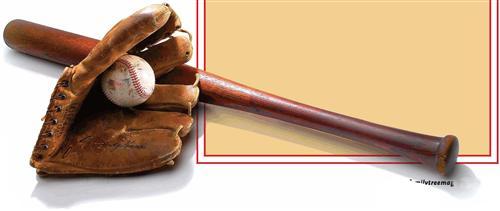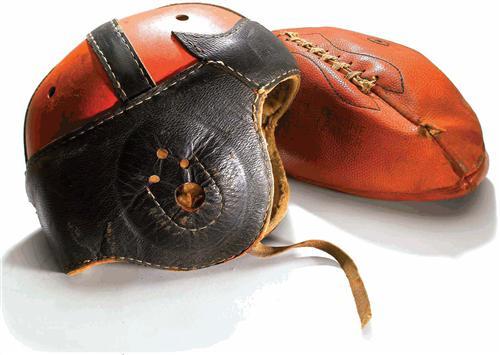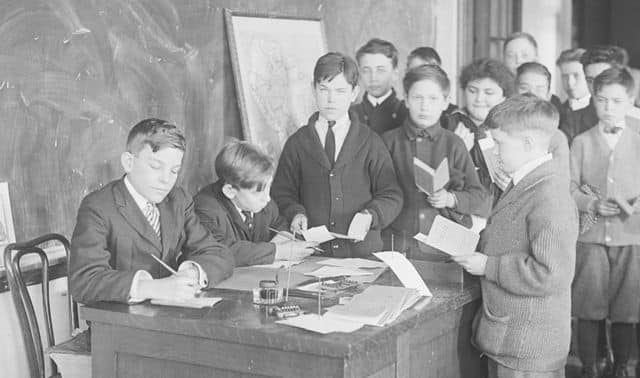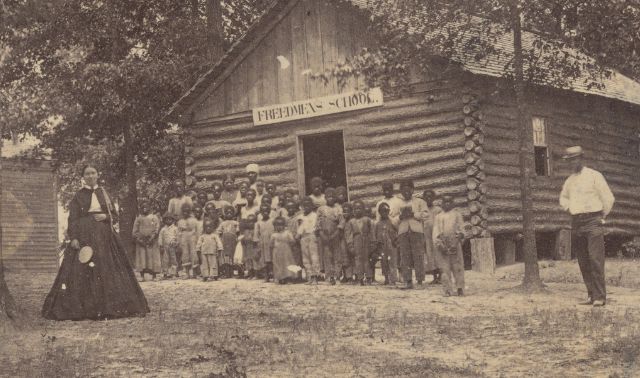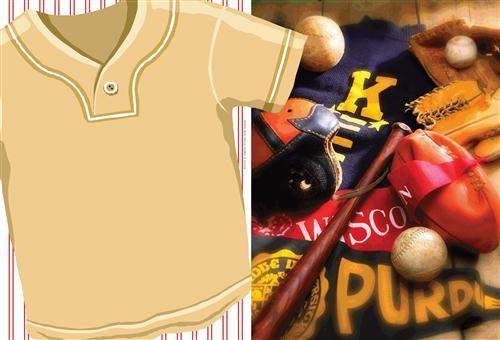
For years, Michigan-based genealogist Jim Ward <freepagesgenealogy.rootsweb.com/~jimward52/ward.htm> knew his paternal grandfather, Alphonsus Ward, mostly from family recollections of an aging man with failing eyesight. But then a photo made his family history search a whole new ballgame. The caption read “Stanton (Mi) Baseball Team 1915.” Under an inked #3, there was Grandpa Phon — a strapping 6-foot-2 player-manager. The other players were named, too; Jim’s already located some of their descendants. Now he’s headed to his state library to scan old newspapers for box scores and articles about his granddad the athlete.
From the majors to local or school teams, old athletic records often are as accessible as yesterday’s sports page. That’s because legions of dedicated sports historians — from professional curators to enthusiastic fans — have saved this material, preserving even the most obscure athletic events. It’s a trove of genealogy data. After all, no one keeps statistics like a sports fan. So step up to the plate and follow our game plan to rack up those family tree points.
Games people played
America’s Puritan founders frowned on idle pleasures, banning sports in the early Colonies. But by the Revolution, work-related pursuits such as shooting and horse racing had gained favor. Athletics as we know them began in the 1850s with the emergence of gentlemen’s sporting clubs that stressed the health benefits of exercise. Post-Civil War industrialization and mechanization meant both more free time and mass-produced sports equipment, making athletic pastimes accessible to the middle class and eventually the working class.
Since then, sports have helped your kin become winners. New immigrants quickly became as American as baseball, hitting home runs in tenement courtyards. Athletics offered a social support system, with teams and pick-up games organized around community, ethnic or religious connections. Sports relieved crowded urban life, and for the economically disadvantaged, fueled the dream of reaching the big leagues. Sports offered your ancestor a metaphor for life in a new nation. Although most squads remained local talent, some reached national acclaim. For example, the Buffalo, NY, YMCA organized the Buffalo Germans basketball team in 1895. It went on to win the basketball gold medal at the 1904 Olympics. The entire team was inducted into basketball’s Hall of Fame.
Finding your own family’s athletic history is a game you can win. Did you save a pennant from high school, or a ball from that championship game? Great-granddad may have done the same. Search home sources for a team photo, tarnished trophy or battered glove. Scrapbooks, school yearbooks and news clippings — even obituaries — may mention a relative’s sports involvement. Someone’s nickname, such as Uncle Stretch, or family lore that Great-aunt Fanny was a tennis star can inspire you, too.
Don’t limit your search to major league sports. Bicycling was once the most popular pursuit in America, according to Steve Carter of the Wheelmen <thewheelmen.org>, a cycling history organization. “In 1900, there were more than 1 million American cyclists and over 3,000 brands of bicycles.” Running really took off in the 1970s, but the Boston Marathon has been going strong since 1897. Or you might find references to these not-so-well-known antique athletics in old letters and journals:
• Quoits: This game of tossing ring-shaped steel hoops gave rise to the modern pastime of pitching horseshoes.
• Rinking: The 1880s version of roller skating was once so popular that parsons warned against doing it on Sundays.
• Pedestrianism: During the 19th century, these long-distance walking events drew hundreds of competitors vying for prizes up to $5,000.
• Sphairitike: Today, you know this sport — first played at Staten Island, NY, in 1874 — as lawn tennis.
Starting line
Claudette Burke, manager of reference services for the Baseball Hall of Fame in Cooperstown, NY, suggests you start by compiling known facts about your athletic kin: full name, birth date and when he or she played (if you’re not sure, take a guess based on the person’s age). A team name would be great — use a magnifying glass to examine jerseys and signs in old photos — as well as a town or region where your kin played. Note variations of immigrant ancestors’ names, since newspapers often printed box scores with just surnames.
Next, estimate your kin’s level of participation. Was he or she pro, semipro or amateur? A hobbyist? Here are some hints for figuring it out:
• Professional:Teams associated with large cities could indicate your ancestor was a major league athlete. That’s exciting in itself, but doubly so because information will be plentiful.
• Semipro or local:Town teams instilled civic pride, and before today’s big-money professional sports, they provided colorful entertainment all over the country. The Hopkinsville Hoppers or a similar small-town name is likely a minor league or community club. Keep in mind minor league team names may have changed over the years as teams moved locales.
• Company:A business-related moniker such as Texaco Chargers indicates a company-sponsored team. These began as extensions of work and, progressive business owners believed, fostered teamwork on the job. Some games drew huge crowds: A 1914 contest between the Telling Stroller Co. and Hanna’s Cleaners, two Cleveland baseball teams, attracted 80,000 fans.
• School:Yale students played a soccerlike form of football as early as 1806. Other school sports, such as tennis, crew, track and swimming, became popular in the 1870s as administrators discovered the teams raised student spirit and alumni donations. Basketball in particular was all the rage for male and female students soon after its invention in 1891. School records, yearbooks, photos and letter jackets may indicate your relative was an ace on the field. Contact the school district, or the local public library if the school is no longer around, to ask where old records are. For help researching school records, see the October 2005 Family Tree Magazine.
Records race
Once you’ve got a handle on your ancestor’s level of play, research him or her using these resources:
• Internet: Sports enthusiasts have been sharing stats online as long as the Internet’s been around, so start your research sitting at your computer. Let’s use baseball as an example. At <www.baseball-ref.com>, you can research nearly every major league player plus coaches and umpires back to the 1870s. It’s a snap to use: Plug in bill harbidge, and get his height, weight, birth and death information, nickname (Yaller Bill), and the teams he played for and when. You’ll even learn he was a southpaw.
You also can see your kin’s home and away uniforms, his team roster, and all his playing stats — games, runs and batting average for every season. A baseball fan can help you read the abbreviations to learn his strengths: Lots of hits indicates physical strength; many stolen bases shows agility. If your kin played baseball between 1887 and 1914, visit American Memory’s Benjamin K. Edwards Collection <memory.loc.gov/ammem/bbhtml/bbhome.html> and search for his baseball card. The subscription Web site Ancestry.com <Ancestry.com > offers biographies and playing stats for 15,000 professional baseball players.
See the toolkit (below) for similar sites on football, basketball and hockey. Did your ancestor play a more obscure sport, such as badminton? Try a Google <google.com> search on the sport plus a team name or place. Badminton new york history yielded information on the Badminton Club of New York, formed in 1878. This strategy works for finding information on semipro or club teams, too. Enter old beatrice milkskimmers Nebraska, and you’ll find team portraits and 1913 standings at Nebraska Minor League Baseball <marian.creighton.edu/~besser/baseball/second.html>. If you don’t know the team’s name, try typing minor league plus the names of the sport and the place to find sites such as MiLB.com, which contains articles about history’s top 100 minor league baseball teams <www.minorleaguebaseball.com/app/milb/history/top100>.
• Newspapers: Sports articles abound, and they’re great sources of both historical information and thrilling play-by-play games. If your ancestor was a pro, you’ll have no problem finding articles in major cities’ newspapers. Most, such as the New York Times, are in online archives — find a list of both free and paid archives at <www.loc.gov/rr/news/oltitles.html>. You also can join a service such as NewspaperArchive.com <www.newspaperarchive.com>, which costs $71.40 per year.
Papers covered semipro, local and school teams, too. Tim Rask, who leads Iowa’s Field of Dreams chapter of the Society of American Baseball Research <sabr.org>, suggests scouring old local newspapers. These tend to be unindexed and on microfilm; look in public libraries and historical societies where the team played. See the state’s US Newspaper Program <www.neh.gov/projects/usnp.html> Web site to find out where to look for local papers.
“Look for coverage at the beginning of the season,” Rask advises. “Local papers often ran little bios on players; especially new ones. Next, check Decoration Day (May 31); there was almost always a game then.” For high school and college athletes, try both local and school newspapers — contact the school or its alumni office to ask where you can find old newsletters.
African-American athletes often organized their own clubs, such as baseball’s Negro Leagues. Exhibition teams and local teams also abounded. In all, the Negro Leagues Baseball Museum <www.nlbm.com> records more than 2,600 men who played segregated baseball, primarily from 1920 to 1960, but some back in the 1880s. Again, newspapers — particularly African-American ones — are your key resource. African-American Newspapers and Periodicals: A National Bibliography edited by James P. Danky (Harvard University Press) lists more than 6,000 titles.
• Historical societies and museums:Since state and local teams were sources of civic pride, the historical society where your ancestor’s team was based may have a collection devoted to area sports. For example, the Wisconsin Historical Society <www.wisconsinhistory.org> has records related to hockey teams that played at the famed Eagle River Stadium. Historical societies also are excellent places to look for information about school sports in the area. Contact the society and ask about your ancestor’s team, or search the National Union Catalog of Manuscript Collections at <loc.gov/coll/nucmc> (read the Frequently Asked Questions page first).
Registration records and other business-related papers for old sporting organizations sometimes survive; these can offer priceless insights. For example, the Baseball Hall of Fame has contracts for most major league and many other baseball players, letting you see what Great-granddad earned. The Wheelmen hold minutes of some bicycle clubs back to the 1890s. (If your kin belonged to a Dayton, Ohio, chapter, they may have rubbed elbows with bicycle makers Orville and Wilbur Wright.) Try universities, too — among the Ball State University library’s <www.bsu.edu/libraries> special collections are records of Indiana sports from the 1906 Shamrock Athletic Club to little league squads.
Museums dedicated to the sport, such as the Naismith Memorial Basketball Hall of Fame <www.hoophall.com/library/library.htm>, may have research libraries and often can recommend appraisers for old equipment and memorabilia. Enthusiasts have formed many societies for the study of individual sports. The Wheelmen, for example, maintain a Web site filled with historical information and photos — comparing them to your picture of Grandma beside a bicycle can help you date the photo. You also can learn interesting social history; for example, an 1880 high-wheeler might price at more than $100 (an affluent family), while some 1900 safety models sold at $12.50 (middle class).
Don’t limit yourself to resources that mention your ancestor. Pad your genealogy point total by reading up on his sport: What equipment did he use? What kind of field did he play on? You’ll be a shoo-in for the family tree-climbing championship.
A League of Their Own
Once upon a time, the prevailing opinion said women were too fragile for sports, or too bold for playing them. But a lifetime before today’s health clubs, independent flappers took up tennis racquets and golf clubs. Women even played baseball: The Vassar College Resolutes were winning baseball games in 1866, sometimes using their long skirts to help catch grounders. Victorian-era “bloomer girls” barnstormed with rocket-armed Alta Weiss, who routinely struck out men.
Web Sites
• Baseball Guru
<baseballguru.com/bbhist1.html>
• Collegiate Football History
• Learning More About Your Athletic Ancestors
<ancestry.com/learn/library/article.aspx? article=11009>
• Olympic Games History
• Pro-Football-Reference.com
• SportingNews.com
<www.sportingnews.com/archives>
• Sports History
<www.library.cmu.edu/Research/Humanities/History/sports.html>
• SportsReference.com
Books
• American Sports: From the Age of Folk Games to the Age of Spectators by Benjamin C. Rader (Prentice-Hall, out of print)
• The Baseball Encyclopedia: The Complete and Definitive Record of Major League Baseball, l0th edition, book and CD (Macmillan, out of print)
• The Biographical Encyclopedia of the Negro Baseball Leagues by James A. Riley (Carroll & Graf Publishers)
• A Brief History of American Sports by Elliott J. Gorn and Warren Goldstein (Hill and Wang)
• Four Centuries of Sport in America, 1490-1890 by Herbert Manchester (The Derrydale Press)
Organizations
• Boston Athletic Association
40 Trinity Place, Fourth Floor, Boston, MA 02116, (617) 236-1652, <www.baa.org>
• Naismith Memorial Basketball Hall of Fame
Edward J. and Gena G. Hickox Library, 1000 W. Columbus Ave., Springfield, MA 01105, (4!3) 231-5523, <www.hoophall.com/library/library.htm>
• The National Baseball Hall of Fame and Museum
25 Main St., Cooperstown, NY 13326, (888) 425-5633, <www.baseballhalloffame.org/library/about.htm>
• North American Society for Sports History
Box 1026, Lemont, PA 16851, <nassh.org>
• Pro Football Hall of Fame
2121 George Halas Drive NW, Canton, OH 44708, (330) 456-8207, <www.profootballhof.com>
• Sporting News Research Center
10176 Corporate Square Drive, Suite 200, St. Louis, MO 63132, (800) 443-1886, ext. 387, <www.sportingnews.com/archives/research>
• United States Hockey Hall of Fame
801 Hat Trick Ave., Box 657, Eveleth, MN 55734, (800) 443-7825, <www.ushockeyhall.com>
• World Golf Hall of Fame
Timeline


